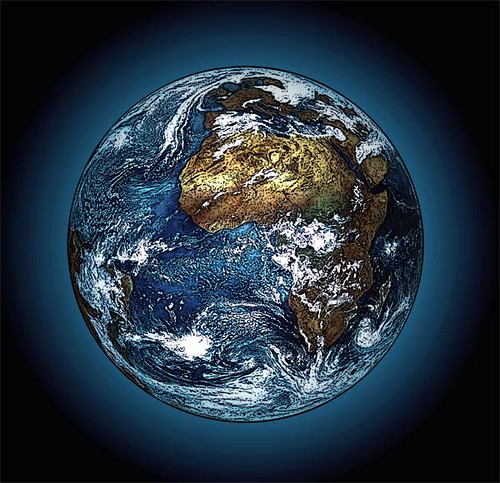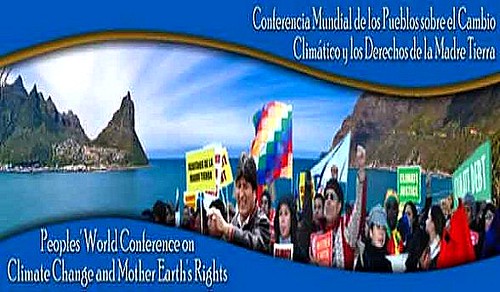
If one asks this question from the point-of-view of Africa, much of which is convulsing after centuries of ruthless exploitation and resource extraction, the political and ecological views often seem dismal -- war, famine and crisis management.
However, a small but proverbial light at the end of a very dark tunnel may be emerging from grass-roots work with local farmers such as the promising projects of the Biochar Fund which seek to transform traditional agriculture into a tool for healing and recovery. The key is to focus on how people and nature might work together for the benefit of all. People of place are assisted in attaining the most democratic of all reforms -- the ability to help themselves and in the process to provide carbon capture and sequestration services for all of us.
The people-vs-nature polarity that dominated the conquests by "civilization"of indigenous people, the more recent spread of industrialism and even the 20th Century conservation ideologies of preserving the environment from people. But the paradigm no longer points the way toward progress. People and nature have never been separate except where there have never been people, which today is nowhere.Clinging to this false dichotomy of separation of people and nature is what makes possible the war between the two. Slowly, we are arriving at another understanding that people and nature are connected and that both have rights.

This transcendence of the old-school natural-vs-social ecology argument has arrived with the 21st Century emphasis on sustainability. But it is also true that there are many problems that people-of-the-land have no control over, such as melting glaciers. One response has been to replace the old people-vs-nature polarity with another dominant theme from the past -- rich vs poor. And this theme has its own set of contradictions which were evident at the Peoples' World Conference on Climate Change and Mother Earth's Rights, including rejections of proposals whereby rich countries might off-set their carbon emissions with payments for avoided deforestation in developing countries (REDD).
The tendency remains to see future possibilities as zero-sum or win-lose because that's the way it's been and continues to be. Naomi Klein has an excellent report of the challenges. initiatives and visions put forth at Cochabamba. Chief among them is the vision that a more democratic approach may offer the process to break the logjam that gave the world the failures of COP-15.
In Copenhagen, leaders of endangered nations like Bolivia and Tuvalu argued passionately for the kind of deep emissions cuts that could avert catastrophe. They were politely told that the political will in the north just wasn't there.
More than that, the United States made clear that it didn't need small countries like Bolivia to be part of a climate solution. It would negotiate a deal with other heavy emitters behind closed doors, and the rest of the world would be informed of the results and invited to sign on, which is precisely what happened with the Copenhagen accord.
When Bolivia and Ecuador refused to rubberstamp the accord, the US government cut their climate aid by $3m and $2.5m respectively. "It's not a freerider process," explained US climate negotiator Jonathan Pershing. (Anyone wondering why activists from the global south reject the idea of "climate aid" and are instead demanding repayment of "climate debts" has their answer here.)
Pershing's message was chilling: if you are poor, you don't have the right to prioritise your own survival. When Morales invited "social movements and Mother Earth's defenders … scientists, academics, lawyers and governments" to Cochabamba for a new kind of climate summit, it was a revolt against this experience of helplessness, an attempt to build a base of power behind the right to survive.
The Bolivian government got the ball rolling by proposing four big ideas: that nature should be granted rights that protect ecosystems from annihilation (a "universal declaration of Mother Earth rights"); that those who violate those rights and other international environmental agreements should face legal consequences (a "climate justice tribunal"); that poor countries should receive various forms of compensation for a crisis they are facing but had little role in creating ("climate debt"); and that there should be a mechanism for people around the world to express their views on these topics ("world people's referendum on climate change").
Democracy as a crisis response surely has its detractors. Recently James Lovelock, co-creator of the Gaia Hypothesis and climate visionary, was interviewed by Leo Hickman in the Guardian:
It is obvious, both from talking to Lovelock and reading his work, particularly his most recent books, that he doesn't have the highest opinion of mankind's capabilities to see the long game and act accordingly.
"I don't think we're yet evolved to the point where we're clever enough to handle as complex a situation as climate change," he responds, when asked whether we are up to the task as a species of tackling climate change. "We're very active animals. We like to think, 'Ah yes, this will be a good policy,' but it's almost never that simple. Wars show this to be true. People are very certain they are fighting a just cause, but it doesn't always work out like that. Climate change is kind of a repetition of a wartime situation. It could quite easily lead to a physical war."
Hopelessness is a response, one senses, never far from a Lovelock audience. He is not one to toss around crumbs of comfort when he believes they're not justified, and displays a great deal of contempt for what he believes to be the naive idealism and ideologies of much of the current environmental movement – a significant proportion of which still looks up to him with a certain reverence. For example, it was his high-profile switch a few years ago to promoting nuclear energy as the best hope for saving ourselves that helped convince many environmentalists to rethink their instinctive opposition to this technology. Now, he says, he is not convinced that any meaningful response to "global heating", as he likes to call it, can be achieved from within the modern democracies of the western world.
"We need a more authoritative world," he says resolutely. "We've become a sort of cheeky, egalitarian world where everyone can have their say. It's all very well, but there are certain circumstances – a war is a typical example – where you can't do that. You've got to have a few people with authority who you trust who are running it. They should be very accountable too, of course – but it can't happen in a modern democracy. This is one of the problems.
"What's the alternative to democracy? There isn't one. But even the best democracies agree that when a major war approaches, democracy must be put on hold for the time being. I have a feeling that climate change may be an issue as severe as a war. It may be necessary to put democracy on hold.
His views on carbon emissions trading, as is being touted by the EU and others, are equally dismissive: "I don't know enough about carbon trading, but I suspect that it is basically a scam. The whole thing is not very sensible. We have this crazy idea that we are setting an example to the world. What we're doing is trying to make money out of the world by selling them renewable gadgetry and green ideas.
But Lovelock is not a bundle of total despair. In an earlier interview with NEW SCIENTIST magazine he was asked:
So are we doomed?
There is one way we could save ourselves and that is through the massive burial of charcoal. It would mean farmers turning all their agricultural waste - which contains carbon that the plants have spent the summer sequestering - into non-biodegradable charcoal, and burying it in the soil. Then you can start shifting really hefty quantities of carbon out of the system and pull the CO2 down quite fast.
Would it make enough of a difference?
Yes. The biosphere pumps out 550 gigatonnes of carbon yearly; we put in only 30 gigatonnes. Ninety-nine per cent of the carbon that is fixed by plants is released back into the atmosphere within a year or so by consumers like bacteria, nematodes and worms. What we can do is cheat those consumers by getting farmers to burn their crop waste at very low oxygen levels to turn it into charcoal, which the farmer then ploughs into the field. A little CO2 is released but the bulk of it gets converted to carbon. You get a few per cent of biofuel as a by-product of the combustion process, which the farmer can sell. This scheme would need no subsidy: the farmer would make a profit.
The best part of a biochar strategy is that farmers and gardeners of every type -- rich and poor, large and small, technologically advanced and simple -- can do it.
So, maybe a people of the land reconnected with ancient indigenous wisdom approach does hold the secret to our most promising future. When stripped of political ideologies and posturing, the reconnection of people to land, to indigenous wisdom, and to each other was the most intriguing and deeper theme of the People's World Climate Conference.
Do we dare say, YES WE CAN?
No comments:
Post a Comment